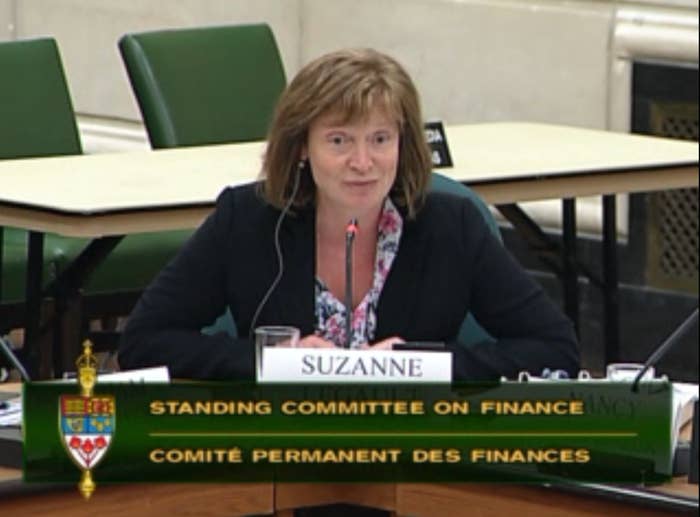
Information Commissioner Suzanne Legeault says Canada's new budget may be illegal and hinted she will challenge it in court.
Legault pleaded with legislators at a Finance Committee meeting Tuesday to back away from a plan to retroactively make gun-registry documents secret from the public.
"You must ask yourselves why," Legault said not once but three times.
The change, she said, will erase a police investigation, distort access to information laws and seal off thousands of records.
"It will effectively, Mr. Chair, erase history," she said.
Her comments stem from one buried section of the 167-page budget bill that Legault said raises constitutional issues of freedom of expression.
In a debate with a government MP Legault said the bill could be illegal — she isn't sure — and that her office is considering its options.
"It will have to be determined by the court unless parliamentarians decide to not pass this bill," she said.
Asked afterward by BuzzFeed Canada if her office would launch a legal challenge, Legault declined to comment, saying only "we shall see."
The government insists it is merely closing a loophole.

In 2012 the Conservative killed the mismanaged long-gun registry that was extremely unpopular in rural Canada.
Before that happened someone requested all of the records under access to information laws. The RCMP did release about 8 million records with identifying details like names redacted. But they may have redacted too much and destroyed information they were legally required to disclose.
Legault's office started an investigation and ultimately found the RCMP did break the law. A timeline can be found here.
Fast forward to this year, the government slipped a passage into the omnibus budget bill that will ban all document requests or complaints about the long-gun registry.
Conservative MP Mark Adler argued this is housekeeping — the will of Parliament is supreme and Parliament voted to destroy the long-gun registry. Also, there's a precedent of governments passing legislation to retroactively change laws.
Legault agreed Tuesday that retroactive bills are legal, but she says she's skeptical of whether this one is.
When the government killed the long-gun registry it made no move to exempt the files from access to information laws. In fact Vic Toews, the Public Safety Minister at the time, even wrote Legault to promise his department would comply with access laws.
So there's the Access To Information Act, which is the law of the land. There's the 2012 Act to repeal the long-gun registry, which allows for access to information requests.
And now there's the 2015 budget bill, which kills an investigation under the first act and arguably changes the spirit of the second. So the question is: we know government can change laws retroactively, but does this one go too far?

Legault is already launching a federal court action in support of the person who originally requested the records. She's also ordered the production of 30,000 documents. Both of those will be erased if the budget is passed. Gun owners also could not confirm if their data was destroyed, and no one would know the costs of the data destruction, she said.
From there her only move may be to challenge the budget bill in court as unconstitutional.
After being challenged on the issue in the House of Commons, Public Safety Minister Steven Blaney signalled the government will not back down. He defended the bill as necessary to allow the RCMP to follow the will of parliament.
"He budget implementation act is closing the loophole that prevents officers from respecting the will of Parliament," he said last week.
"We will support that bill, close the loophole and defend Canadians."
